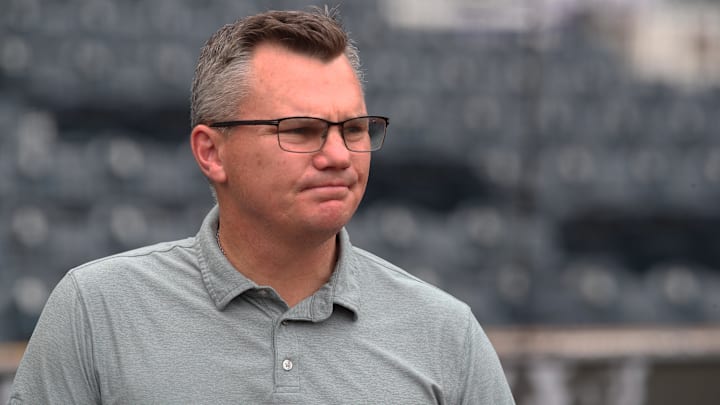On Sunday, the Pittsburgh Pirates completed their seventh consecutive losing season, including their sixth straight with Ben Cherington as general manager. After finishing with the worst record in baseball (19-41) in the pandemic-shortened 2020 season, they went on to post back-to-back 100-loss seasons in 2021-22 and consecutive 76-win seasons in 2023-24. The 2025 campaign saw them take a step back, finishing 71-91.
So, naturally, they're bringing Cherington back for a seventh season. You truly can't make this stuff up.
After announcing a contract extension for manager Don Kelly (which was the right move), the Pirates went on to make the announcement that no fan wanted to hear – that Cherington would be back as GM in 2026. And as if that wasn't already frustrating enough, wait until you hear their reasoning for it.
“I think given where this team is at this point in time, the strengths that we have in terms of our pitching staff, the young core of position players that we have and what we have in our farm system coming up, we felt at the end of the day that making any changes as a general manager would set us back,” Pirates team president Travis Williams said Tuesday. “It’s not what our fans expect. That’s not what we expect. We’re looking in 2026 to make the playoffs. Period. Full stop. We did not want to veer from that. We’re pushing it all in to make sure we’re able to make the playoffs in 2026.”
Why #Pirates President Travis Williams thought it was right to keep GM Ben Cherington pic.twitter.com/AT9TQ8eL9U
— 93.7 The Fan (@937theFan) September 29, 2025
Pirates president's Ben Cherington defense highlights massive disconnect with fans
Cherington’s tenure in Pittsburgh was supposed to represent a full organizational reset, a modern rebuild after the Neal Huntington era fizzled out. Instead, many of his decisions have set the Pirates back even further, for reasons tied to roster construction, player development and overall direction.
Cherington has repeatedly traded away talent without getting adequate returns (Josh Bell, Joe Musgrove, Jameson Taillon, David Bednar and the list goes on). Instead of replenishing the system with high-ceiling prospects, Cherington’s deals often brought in depth guys who lack star upside, leaving the organization thin at the very top.
The Pirates under Cherington have consistently ranked near the bottom of the league in nearly every offensive category, and his free-agent signings have all been short-term fillers instead of building blocks. This has left the Pirates in a perpetual cycle of "waiting for the youth" with no veteran safety net.
While Paul Skenes is a rare success story, the lack of broader development suggests systemic problems in Pittsburgh's prospect pipeline under Cherington. For a GM brought in with a reputation for rebuilding farm systems, this is arguably his biggest failure.
Instead of building around a young core, Cherington has repeatedly traded away key contributors, delaying the “window” over and over. The team was never aggressive in supplementing its roster when opportunities existed, so by the time Skenes emerged as a frontline ace in 2025, the supporting cast was so barren that his prime years are already being wasted.
Fans expected Cherington to modernize the Pirates the way he helped the Boston Red Sox and Toronto Blue Jays. Instead, his tenure has merely been a cycle of selling off players, waiting on prospects, and losing 90-plus games.
Cherington executed a rebuild without a clear direction, traded away value for mediocre returns, failed to develop his prospect base and never committed to building a functional MLB roster. Instead of moving the Pirates closer to contention, his tenure has entrenched them deeper in irrelevance.
If the Pirates really think that getting rid of Cherington will set the organization back farther than he already has, they may be more disconnected from reality than anyone realized.
